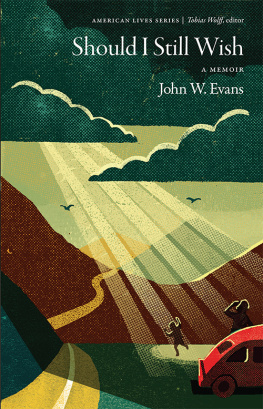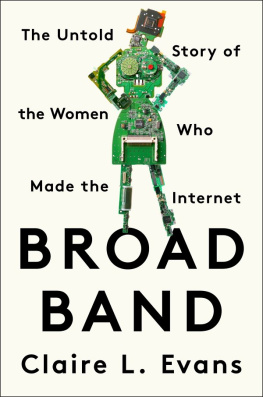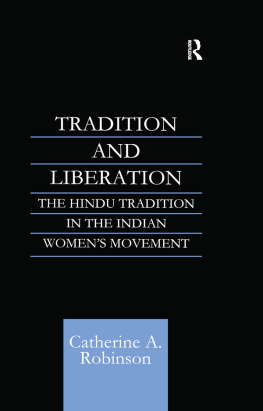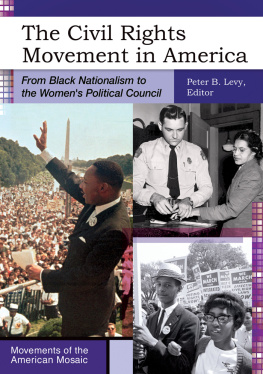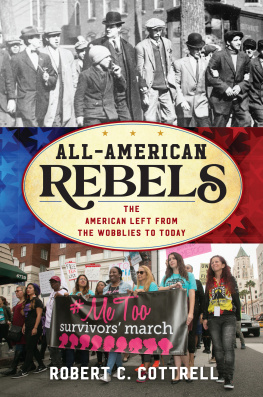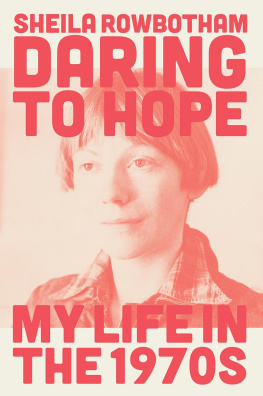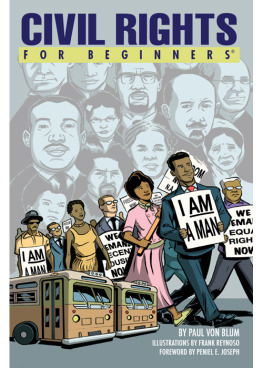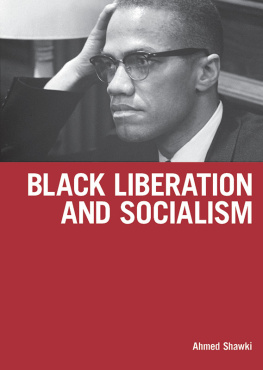Evans - Personal politics: the roots of womens liberation in the civil rights movement and the new left
Here you can read online Evans - Personal politics: the roots of womens liberation in the civil rights movement and the new left full text of the book (entire story) in english for free. Download pdf and epub, get meaning, cover and reviews about this ebook. City: Verenigde Staten, year: 2015;2010, publisher: Knopf Doubleday Publishing Group;Vintage Books, genre: Politics. Description of the work, (preface) as well as reviews are available. Best literature library LitArk.com created for fans of good reading and offers a wide selection of genres:
Romance novel
Science fiction
Adventure
Detective
Science
History
Home and family
Prose
Art
Politics
Computer
Non-fiction
Religion
Business
Children
Humor
Choose a favorite category and find really read worthwhile books. Enjoy immersion in the world of imagination, feel the emotions of the characters or learn something new for yourself, make an fascinating discovery.

- Book:Personal politics: the roots of womens liberation in the civil rights movement and the new left
- Author:
- Publisher:Knopf Doubleday Publishing Group;Vintage Books
- Genre:
- Year:2015;2010
- City:Verenigde Staten
- Rating:5 / 5
- Favourites:Add to favourites
- Your mark:
- 100
- 1
- 2
- 3
- 4
- 5
Personal politics: the roots of womens liberation in the civil rights movement and the new left: summary, description and annotation
We offer to read an annotation, description, summary or preface (depends on what the author of the book "Personal politics: the roots of womens liberation in the civil rights movement and the new left" wrote himself). If you haven't found the necessary information about the book — write in the comments, we will try to find it.
Evans: author's other books
Who wrote Personal politics: the roots of womens liberation in the civil rights movement and the new left? Find out the surname, the name of the author of the book and a list of all author's works by series.
Personal politics: the roots of womens liberation in the civil rights movement and the new left — read online for free the complete book (whole text) full work
Below is the text of the book, divided by pages. System saving the place of the last page read, allows you to conveniently read the book "Personal politics: the roots of womens liberation in the civil rights movement and the new left" online for free, without having to search again every time where you left off. Put a bookmark, and you can go to the page where you finished reading at any time.
Font size:
Interval:
Bookmark:
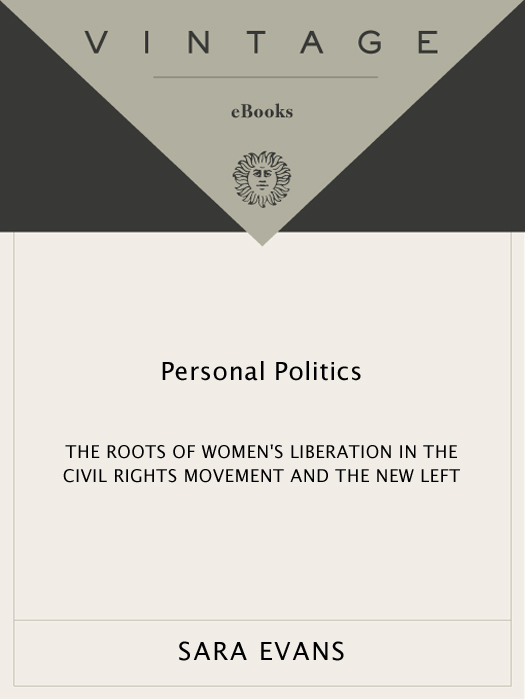
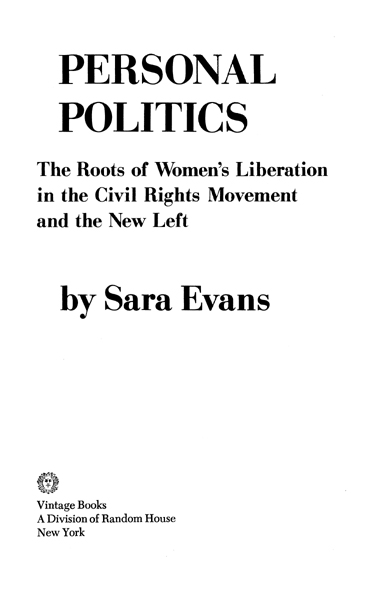
Vintage Books Edition, February 1980
Copyright 1979 by Sara Evans
All rights reserved under International and Pan-American Copyright Conventions. Published in the United States by Random House, Inc., New York, and in Canada by Random House of Canada Limited, Toronto. Originally published by Alfred A. Knopf, Inc., New York, in 1979.
Grateful acknowledgment is made to the following for permission to reprint previously published material:
Beacon Press: An excerpt from SNCC: The New Abolitionists by Howard Zinn. Beacon Press, Boston, 1964.
Liberation Magazine: For their kind permission to reprint Sex and Caste, a memo by Casey Hayden and Mary King. Published in April 1966.
McGraw-Hill Book Company: An excerpt from Letters from Mississippi by Elizabeth Sutherland. Copyright 1965 by McGraw-Hill, Inc. Used with permission of McGraw-Hill Book Company.
The New Republic: Of, By and For the Poor: The New Generation of Student Organizers, by Andrew Kopkind, New Republic, vol. 152, June 19, 1965;
Raising the Question of Who Decides, by Casey Hayden, New Republic, vol. 153, January 22, 1966. Reprinted by permission of The New Republic, 1965, 1966, The New Republic Inc.
Southern Exposure: We Started from Different Ends of the Spectrum, by Cynthia Washington, Southern Exposure, IV, 4, Winter 1977. Special issue entitled Generations: Women in the South, .
Studies on the Left: Newark Community Union, by Jesse Allen from Studies on the Left, V, Winter 1965 and Chicago: JOIN Project, by Richard Rothstein from Studies on the Left, V, Summer 1965.
Viking Press: An excerpt from Freedom Summer by Sally Belfrage, New York, Viking Press, 1965.
Library of Congress Cataloging in Publication Data
Evans, Sara.
Personal politics.
Reprint of the 1979 ed. published by Knopf, New York.
1. WomenUnited StatesSocial conditions.
2. RadicalismUnited States. 3. FeminismUnited States. 4. Civil rightsUnited States. I. Title.
[HQ1426.B9 1930] 301.4120973
79-22485
eISBN: 978-0-307-77360-9
v3.1
For my mother
Maxilla Everett Evans
When I began this study I knew the outlines of a story that was waiting to be told. As a newcomer to Chicago in October 1967, I fortuitously joined one of the earliest womens liberation groups. In that group and others then forming I first became aware of national new left networks and began to see the impact of womens experiences in the southern civil rights movement and in community organizing. My previous experience had been primarily as a local participant in a few civil rights marches, a drive to organize nonacademic employees at Duke University, and as North Carolina coordinator for Vietnam Summer (1967).
I remember myself that year as a quiet but passionate participant in what we all believed was a historic undertaking: the creation of a new, radical feminist movement. The following summer I returned to North Carolina with missionary zeal to spread the word (and to engage in a style of community organizing that I later learned was distinctly out of fashion in the new left). In the fall of 1969 I entered graduate school at the University of North Carolina determined to study womens history. I did not know then that hundreds of women all over the country were doing the same thing; but I was reassured by the example of my former teacher Anne Firor Scott, who had been studying women when I met her in 1963. The idea for this study emerged some years later as I cast about for a dissertation topic. In a conversation with Peter Filene I described the new left origins of contemporary feminism as a history that someday I hoped to write. He urged me not to wait and throughout the project provided the kind of painstaking criticisms and suggestions that one expects but too seldom receives from teachers and colleagues. Armed with further ideas from a sociologist friend, Paula Goldsmid, about how such an investigation might be pursued, I got support from my advisor, George Mowry, to proceed.
From the outset I was aware that my own backgroundsouthern, white, activist, feministwould profoundly influence this work. The influence could, I knew full well, amount to distortionthe substitution of my own experience for that of others (autobiography for history) and the failure to ask questions that could lead to information and interpretations which would challenge my assumptions. At the same time, my own participation and experience, used rigorously and self-consciously, might provide the kinds of intuitions and empathetic leaps that inform all historians as they come to know their material intimately. Fortunately, I had neither met nor heard of most of the people I interviewed before I began this research, nor was I present at the main events described here. As was the case with thousands of other women, my experiences were a local variant of a national story from which I could sometimes draw empathetic resonance but little more. Yet the rapport that developed in many interviews resulted in part from my own and my informants confidence that my prior research and my personal experience together allowed me to comprehend what they had to say in a way that no outsider could. The results, time after time, were extraordinary. I only hope I have done justice to the histories with which I have been entrusted.
There is not time or space to describe the anxious, ecstatic summer of my oral research. I prepared for it by attending Lawrence Goodwyns inspiring seminar on oral history methodology and by extensive research in traditional literary and archival sources. I set out with a growing file of names, most without addresses, and a list of people with whom I might stay. The research grew as I traveled. I had not imagined the subtle complexity, both positive and negative, of womens experiences in various parts of the new left, or the intricacy of a network of relationships that stretched across the country and over nearly a decade. None of the written sources gave more than the barest hint of what I would find. To all those I interviewed I owe an enormous debt. Most of them accepted my probing questions with surprising trust. Many shared files of movement literature, personal correspondence, and names and addresses. They encouraged meI particularly remember Jo Freeman, who was just finishing her own fine study of the womens movement, assuring me that it could be done. They reshuffled schedules to accommodate me on a days notice, meeting me in a variety of probable and improbable settings: kitchen tables, clattering restaurants, a Cape Cod beach, Mary Baker Eddys tomb, a city park bench, a busy womens center. They, and others who housed me as I traveled, lent me cars and shared their food.
I could have interviewed dozens more. There were names for which I never found addresses, people who were not available when I was, cities I never visited. I finally stopped, however, believing that the structure of the analysis I have presented would be altered more in detail than in substance with further information. This is a collective story concerning patterns more than a set of individuals. While there are many more names that could appear here, I hope that many of the women not mentioned will feel spoken for. And I know that there are many other stories yet to be written.
Throughout this long process I have relied on the critical judgment and warm support of colleagues and friends too numerous to name. In particular, however, I want to thank William H. Chafe, Jacquelyn Dowd Hall, Donald Mathews, Jane DeHart Matthews, Sandra Powers, James OBrien, and Pamela Oliver. A grant from the University of Minnesota gave me time for rewriting and additional research. In revising the manuscript I received useful criticisms from Ames Sheldon Bower, Charlotte Bunch, Casey Cason, David Lelyveld, John Modell, and Mary Rothschild; and from my editors at Knopf, Alice Quinn, Ellen Mastromonaco, and Ann Adelman. The Charlotte Perkins Gilman group and its predecessor sustained and nourished me before and during this work. My parents, Maxilla Everett Evans and Joseph Claude Evans, Sr., contributed in myriad ways, as they know. Craig Chatten Evans Boyte kept me rooted in the real world.
Font size:
Interval:
Bookmark:
Similar books «Personal politics: the roots of womens liberation in the civil rights movement and the new left»
Look at similar books to Personal politics: the roots of womens liberation in the civil rights movement and the new left. We have selected literature similar in name and meaning in the hope of providing readers with more options to find new, interesting, not yet read works.
Discussion, reviews of the book Personal politics: the roots of womens liberation in the civil rights movement and the new left and just readers' own opinions. Leave your comments, write what you think about the work, its meaning or the main characters. Specify what exactly you liked and what you didn't like, and why you think so.





